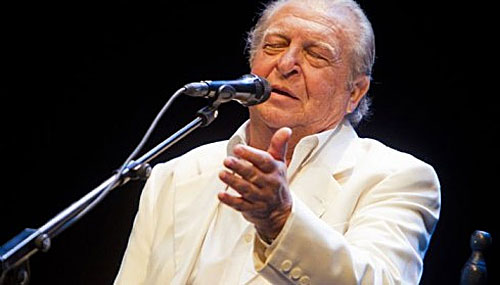One of Spain’s legendary flamenco singers and trendsetters, El Lebrijano passed away in Sevilla on July 13, 2016.
Juan Peña Fernández, “El Lebrijano” was born in Lebrija (Sevilla) in 1941, within a well-known family of Gypsy flamenco performers such as Perrata y Perrate, Fernanda y Bernarda de Utrera, Bambino, Turronero, Gaspar de Utrera, Miguel Funi, Diego del Gastor, Pedro Peña, Pedro Bacán and Dorantes, among others.
El Lebrijano started his career at 17, playing guitar in a show by La Paquera de Jerez. However, his guitar career didn’t last very long. When a singer fell ill, El Lebrijano replaced him and became a cantaor (flamenco singer).
He was hired by the tablao (flamenco nightclub) “La Venta de Antequera” and later moved to Madrid to work at the iconic “El Duende” and “Los Canasteros” clubs.
Antonio Gades heard El Lebrijano and recruited him for his flamenco company that toured throughout the world. El Lebrijano later toured with Manuela Vargas. After that, he initiated his solo career.
His first recording was “Juan Peña El Lebrijano” (Columbia, 1963) that was followed by singles. El Lebrijano’s first LP was “De Sevilla a Cadiz” (Columbia, 1969). His popularity grew and with the support of his manager Juan Antonio Pulpón, he toured throughout Spain.
El Lebrijano was an innovator. In 1972 he released “La palabra de Dios a un gitano” ” (The word of God to a Gypsy) on the Philips label. He pioneered the use of symphonic and choral voices in flamenco.
Next came “Persecución” (Philips, 1976), which translates as pursuit. Here, he exposed the discrimination suffered by gypsies in Spain during different time periods.
In 1979, he brought flamenco to one of the most prestigious venues in Europe, the Teatro Real de Madrid (the Royal Theater). The concert was released with the title “Flamenco en el Teatro Real” (Philips, 1979).
In 1982, he released “Ven y Sígueme” (Come and Follow Me) on RCA, using the figure of Christ and the Gospels to demand social justice. The album included two essential Spanish artists, Rocio Jurado and Manolo Sanlúcar.

El Lebrijano’s next project was a collaboration with an orchestra of North African musicians who kept alive the ancient Arab-Andalusian music. The result was “Encuentros” (Encounters), released in 1985 on Ariola. This proved to be a controversial move, criticized by purists who didn’t like these cross-cultural collaborations. El Lebrijano was not intimidated by these reactions and, in the following years, he released two additional collaborations with Arab musicians, “Casablanca” (EMI, 1998) and “Puertas abiertas” (Senator, 2005).
In “Tierra” (1989), El Lebrijano told the travel stories of the intrepid Spanish adventurers and explorers who traveled to the Americas.
Another significant album in El Lebrijano’s career was “Lágrimas de Cera” (Tears of Wax) on EMI, released in 1999. This was a tribute to the Andalusian Holy Week. El Lebrijano surprised everyone once more by adding a Bulgarian choir.
El Lebrijano won many awards and distinctions, including the Medal of Andalusia (1986), awarded by the Andalusian government; and the Labor Medal (1999), granted by the government of Spain. In April 2010 he received an award in the category of music at the III Premios de la Cultura Gitana (3rd Gypsy Culture Awards).
Author: Angel Romero
Angel Romero y Ruiz has dedicated his life to musical exploration. His efforts included the creation of two online portals, worldmusiccentral.org and musicasdelmundo.com. In addition, Angel is the co-founder of the Transglobal World Music Chart, a panel of world music DJs and writers that celebrates global sounds. Furthermore, he delved into the record business, producing world music studio albums and compilations. His works have appeared on Alula Records, Ellipsis Arts, Indígena Records and Music of the World.


